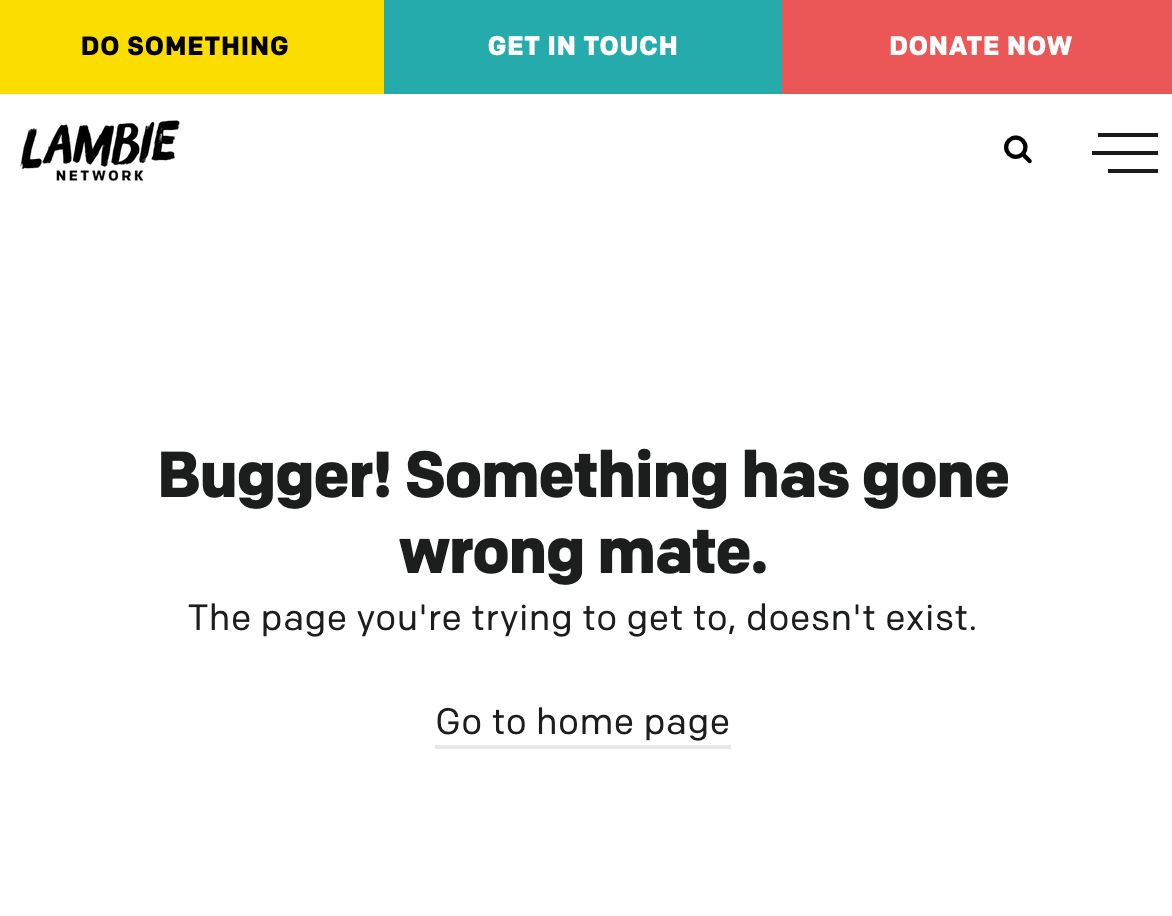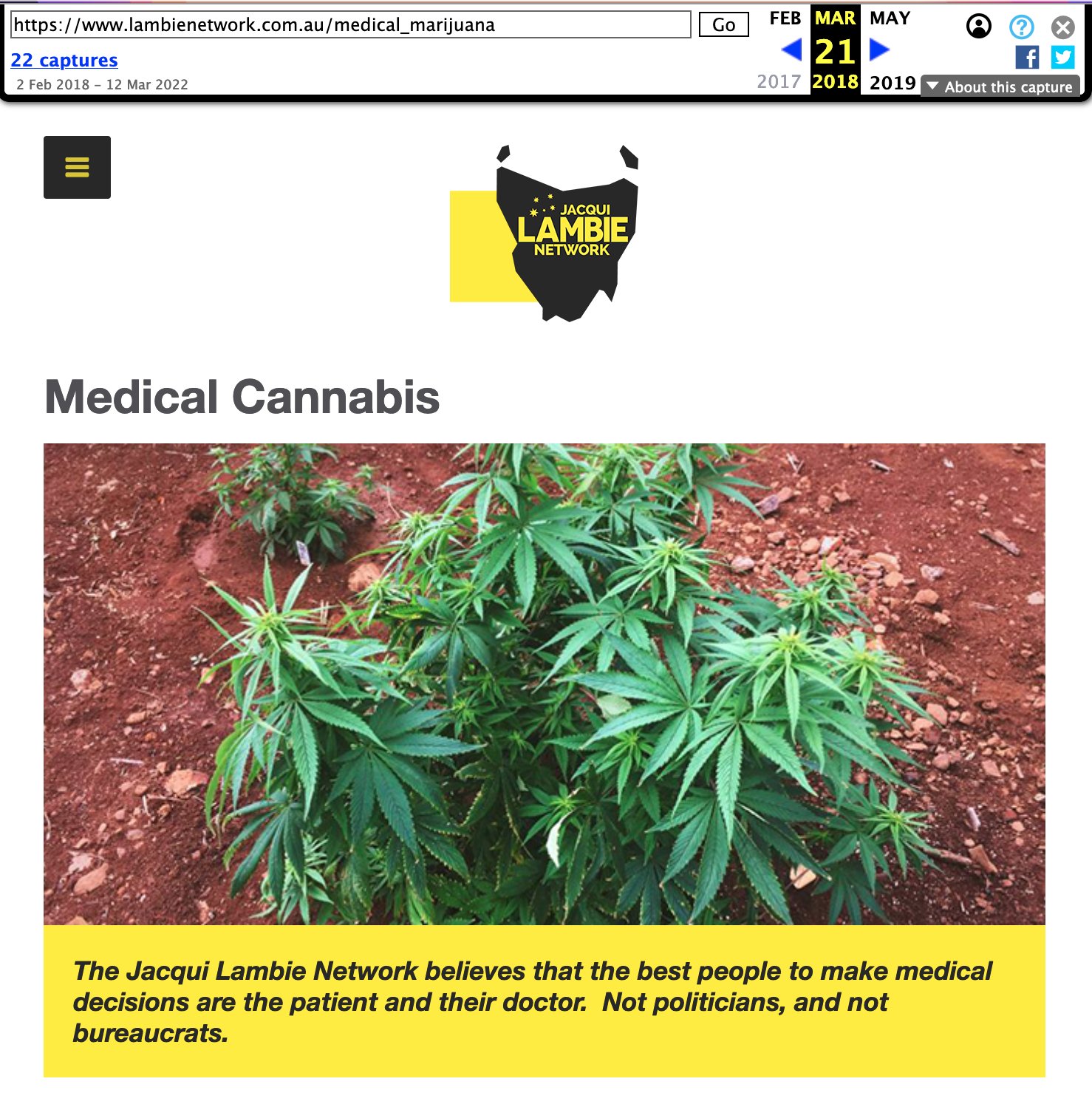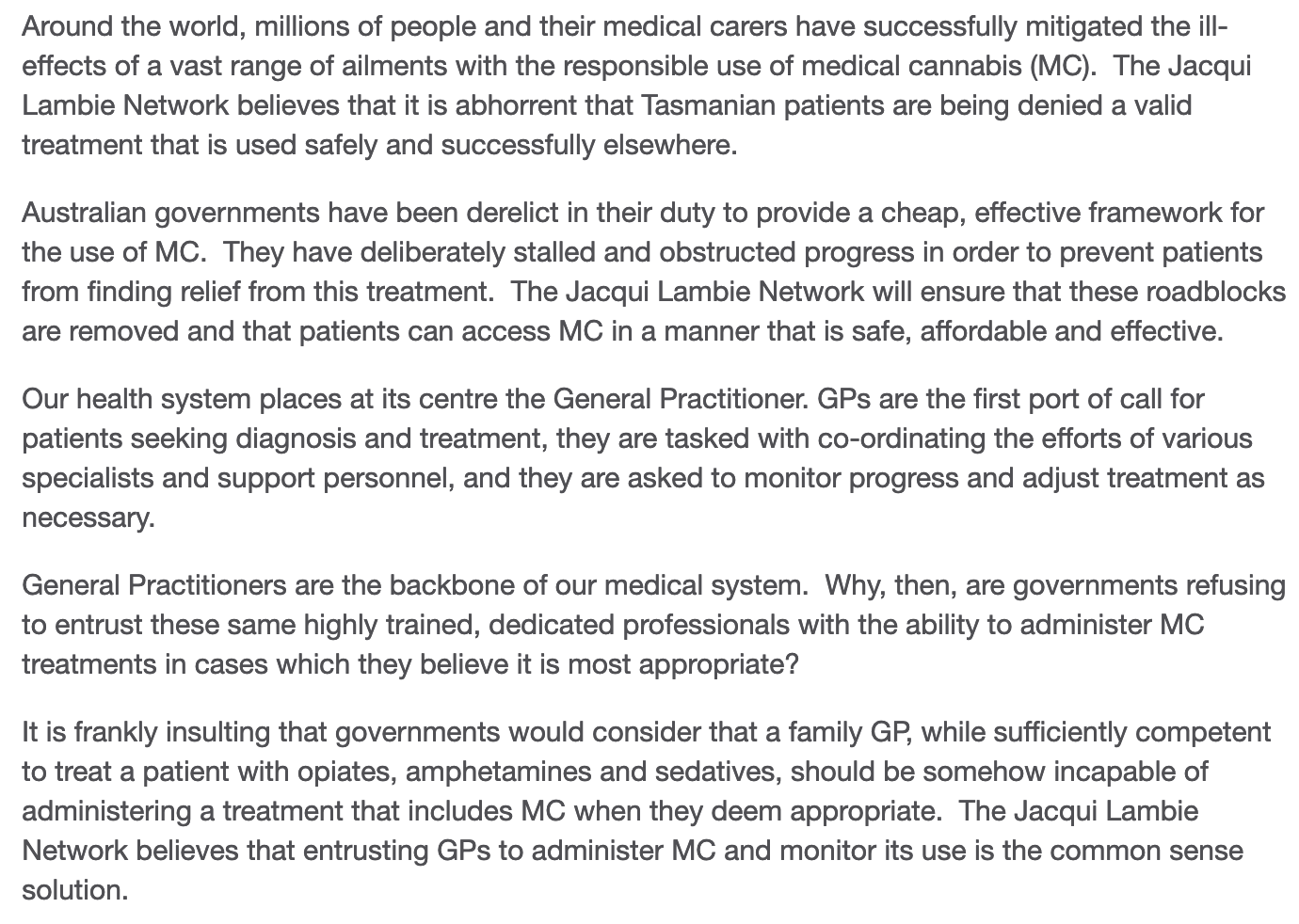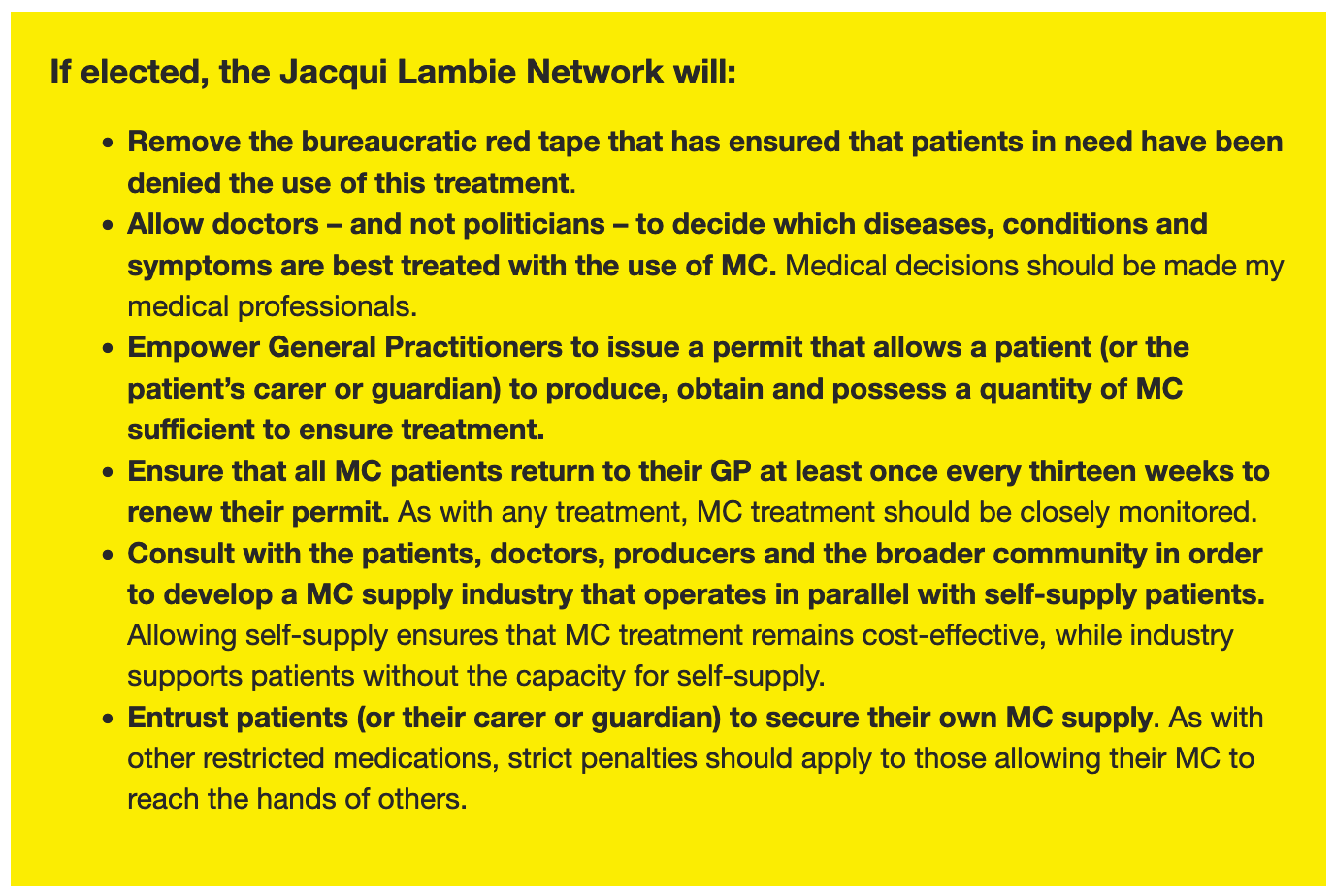Groundhogs don't get human rights
Despite having Labor governments in nearly all Australian states and territories, none have sought to try and move the needle on homegrow to help patients.

The recent announcement from Greens about a new push on legalisation is, in my view, unlikely to help the very people who need access to cannabis the most.
BREAKING: we’ve just received costings that legalising cannabis will generate $28 billion!! That’s enough to build affordable homes for 280 000 people or raise jobseeker by $80 a fortnight.
— David Shoebridge (@DavidShoebridge) January 29, 2023
Let’s legalise it.
To be perfectly clear, those that need access the most are the genuine patients and carers who continue to fight numerous governments of all persuasions to deliver sensible reform to the Australian medical cannabis regime.
A regime that was introduced in 2016 and continues to be one of the most expensive and difficult to access legal schemes in the world today.
Patients have been fighting for change to the Australian medical cannabis system from the very first day of it coming into effect.
They pointed out the problems and forced the previous conservative LNP government to hold an official inquiry that took submissions from experts, patients, doctors and researchers from all over the world to create a better system.
Patients and their advocates thought they’d actually achieved something, but they were misled and deceived by the process and the media distractions now proven to be a standard operating procedure of the previous government.
The change everyone thought was coming after the cross party Senate held their Inquiry, Current barriers to patient access to medicinal cannabis in Australia, has turned into a feeling of isolation and distrust of the process and politicians in general.
Nothing has moved.
There is no fresh breeze of new ideas.
With the recent announcement from the Greens, it is impossible for me to think we’re not just back to where we started.

When I read through the list of recommendations made in the report that were handed down in March 2020, I remember the disappointment when I first saw that the most important recommendation fought for by patients was the very last recommendation made by the Senate committee.
Recommendation 20: The committee recommends that the Australian Government, through COAG, encourage a review of state and territory criminal legislation in relation to:
amnesties for the possession and/or cultivation of cannabis for genuine self-medication purposes;
and
current drug driving laws and their implications for patients with legal medicinal cannabis prescriptions.
We were an afterthought at best.
Although I was happy to see it in writing, I was sad that they left us until the absolute last item on the list and we were lumped in with impaired / non impaired driving.
I, along with many other patients, hoped for genuine change and that in the absence of any action from the Commonwealth directly, it was thought that one or more of the States would push forward on behalf of patients in the way identified by the Senate committee, with state based amnesty provisions, but we were wrong.
When the government finally got around to responding to the list of recommendations nearly a year later in February of 2021, this is all we got;
Response: Noted.
On 29 May 2020 the Prime Minister announced the replacement of COAG by the National Federation Reform Council, with decision-making by the National Cabinet.
The Government does not support the provisions of amnesties for possession and/or cultivation of cannabis through illegal sources, as there are straightforward legal means by which to obtain medicinal cannabis products on the prescription of a medical doctor.
Drug driving laws are legislated by the states and territories, although during 2020 the Advisory Council for the Medical Use of Cannabis is reviewing the implications for driving for patients prescribed medicinal cannabis.
In the time since then, a government has come and gone, but the laws around medical cannabis have stayed the same.
Despite having Labor governments in nearly all states and territories, none have sought to move the needle on homegrow to help patients.
The only sign of movement patients have seen in respect to actual legislative reform has come from the Greens and it was driven directly by patients.
The Greens in the Senate moved an amendment to the government Narcotics Drugs Amendment Bill 2022 specifically around the subject of a homegrow amnesty for genuine patients.
It is very important to remember that the amendment failed on a vote of 13 to 31, with 32 Senators not even bothering to vote.
It is also important to remember that many of the no votes and abstainers were from the cross bench and Labor who have previously said they would support patients.
Senator Jacqui Lambie for example, had previously shown support for homegrow, or self supply as she called it.
Her website had a page specifically around the topic of medical marijuana.
Unsurprisingly though, just as the Senator did in the vote for an amnesty provision, it no longer shows up when you need it, and instead returns a 404 with a custom message targeted directly at her base.

Thanks to the Internet Archive we’re able to see what Senator Lambie’s page used to look like when she did support a patient’s right to grow their own cannabis.



Senator Lambie appears to have gone from advocating for common sense self-supply of cannabis, to just not bothering to vote and deleting any reference to it from her website.
This is probably a good time to remind everybody that gay marriage took 22 separate legislative attempts in the Australian Parliament before it found any success with a non-binding plebiscite.
So, it is with this thought front of mind when I say that patients need to take a leaf out of the gay marriage playbook by taking a united stance towards human rights and the corresponding rights of patients to grow their own medical cannabis.
Patients and adult use advocates need to get behind a common push to advance the issue of an amnesty for genuine patients if there is ever going to be a positive movement on cannabis access in Australia.
A home-grow amnesty for patients is the logical first step in any campaign for a wider push at legalisation based upon the human rights foundations created by genuine patients.
I believe that legal and affordable cannabis will come with a 2-step process.
First step is an amnesty provision for genuine patients based upon human rights.
Second step is the same provision but applied to all adults.
Working as a form of de facto decriminalisation, and in accord with our international obligations under the UNSCOND, an amnesty approach is based squarely upon protecting the human rights of the citizens who live here.
If we continue to push for Bills that have a minority of mainstream public support (like the Greens full legalisation policy), it stands to reason that we will fail in any practical application of them in the Parliament.
We need to be pushing elected reps for Bills that include those things which have been shown to have a clear majority of mainstream support that can be forcefully argued on the basis of human rights and our obligations to uphold them both domestic and international.
This human rights based approach has already been proven to work in other countries like Thailand and Mexico, where the human rights of the population have taken priority over the need for corporations to be able to make as much money out of us as they can.
A radical concept, but one I think is worth serious consideration.
Australia is stuck in a literal miasma of policy paralysis.
The corporate grifters have infiltrated every level of government and the influence they hold over the Australian government policy on cannabis maintains a state of prohibition solely in order to extract a larger profit margin than they would otherwise be capable of achieving with an open market situation like tomatoes.
The effect of a restricted market is less competition and more capacity to extract the highest margins from the regulatory captured customer base.
My suggestion to all political parties is simply this;
Embrace the concept of human rights, and most especially as it relates to patients and our right to grow our own uncontaminated cannabis for medical use.
To this end, we are fortunate in having been given a roadmap for achieving this by the South East Monash Legal Service (SEMLS) in their most recent submission (13.1.23) to the Parliamentary Joint Committee on Law Enforcement Inquiry: Australia’s illicit drug problem: Challenges and opportunities for law enforcement.
Their submission provides patients with the legal arguments to support claims of having human rights infringed and actual harms caused, by a punitive and prohibition based approach to cannabis in general, and the home cultivation of it specifically, to those patients who are unable to afford the medical cannabis or access the cannabis specific prescribing services that are currently on offer to everyone else.
The SEMLS submission details why the current approach is failing, and it gives compelling reasons for change, detailing the logic and the legal arguments in the process, based directly on human rights and the Victorian Charter that is said to be upholding them.
It details the differences between a system claiming to make medical cannabis practically accessible, when it is in fact only technically accessible, and how that distinction has led to several unsuccessful, high profile prosecutions*.
(*Two of those prosecutions mentioned in the submission resulted in a good behaviour bond and no conviction, in the case of Jenny Hallam, and an acquittal in the case of Dr. Katelaris.)
Talking about the creation of inequities in access based on financial and geographic grounds, explaining how the use of criminal law against sick and dying patients, exacerbates and magnifies people’s suffering at a time of their greatest need.
Specifying the United Nations and their 31agency strong call in 2019 for decriminalisation of drugs and a move away from ineffective punitive approaches.
Calling on the committee to take into account the international shift away from punitive responses to drug use and for human rights based approaches to cannabis to be in the form of decriminalisation and legalisation.
The submission makes it very clear that ”existing approaches to medicinal cannabis create the enabling conditions for more punitive responses, which is at odds with both recent international developments and the purpose of opening up access to medicinal cannabis to begin with.”
It goes on to detail the specific implications for other states and territories in Australia, who also have human rights obligations via our international agreements and for those like Queensland and the ACT that also have distinct human rights charters.
The Victorian Charter of Human Rights is very specific and it interestingly, goes much further than the Australian Constitution, which offers citizens very little in the way of relief or inspiration for change in regards to human rights or rights as a citizen of this country.
This means that the legal arguments are likely to carry more weight and have a corresponding greater opportunity for obtaining real relief for patients if they are made in Victoria, where the Charter directly applies.
The SEMLS submission explains how the Victorian Charter recognises specific types of rights that may be relevant to MC patients, including the right to recognition and equality before the law, the right to life, and the right to be protected from torture and cruel, inhuman or degrading treatment.
Interestingly, the submission also mentions section 14 of the Victorian Charter which allows for freedom of thought, conscience, religion and belief, and offers insight into how this argument might be framed to achieve a similar result to Mexico.
In effect, we’ve just been handed 4 distinct approaches that apply in Victoria (and possibly QLD and ACT) to argue that human rights are the basis for improving access to medical cannabis for patients via an amnesty on homegrow.
It’s time we start using them.





